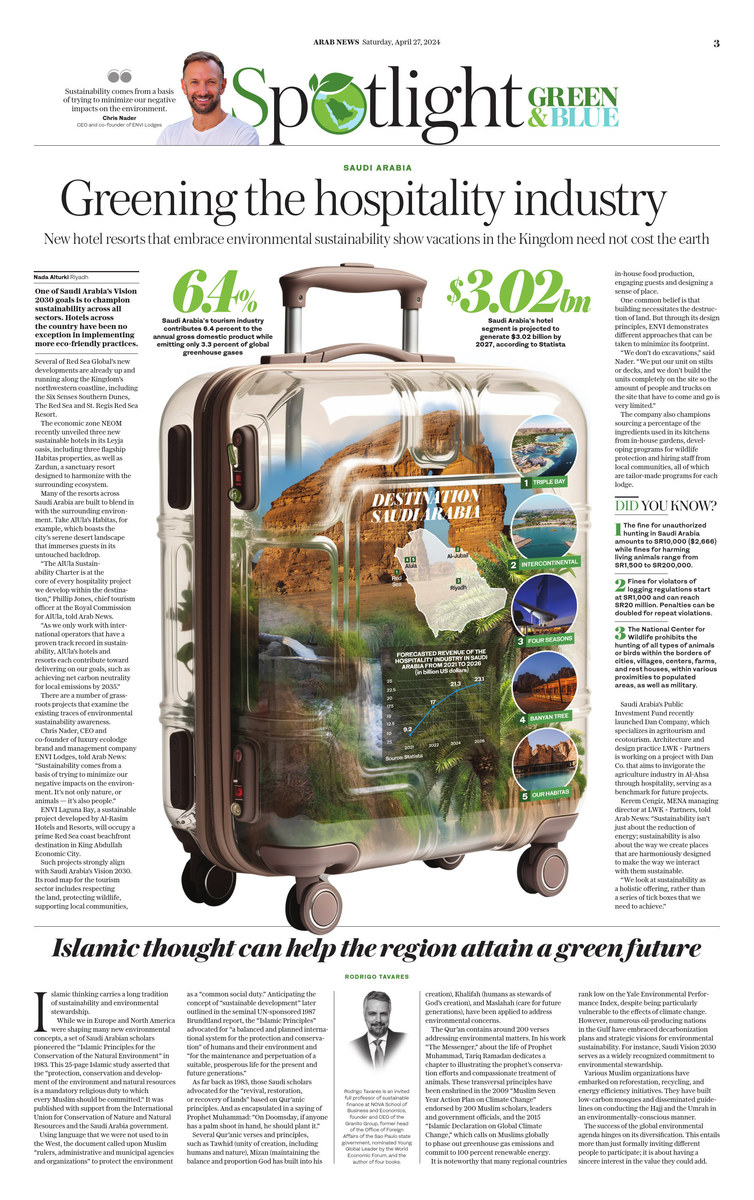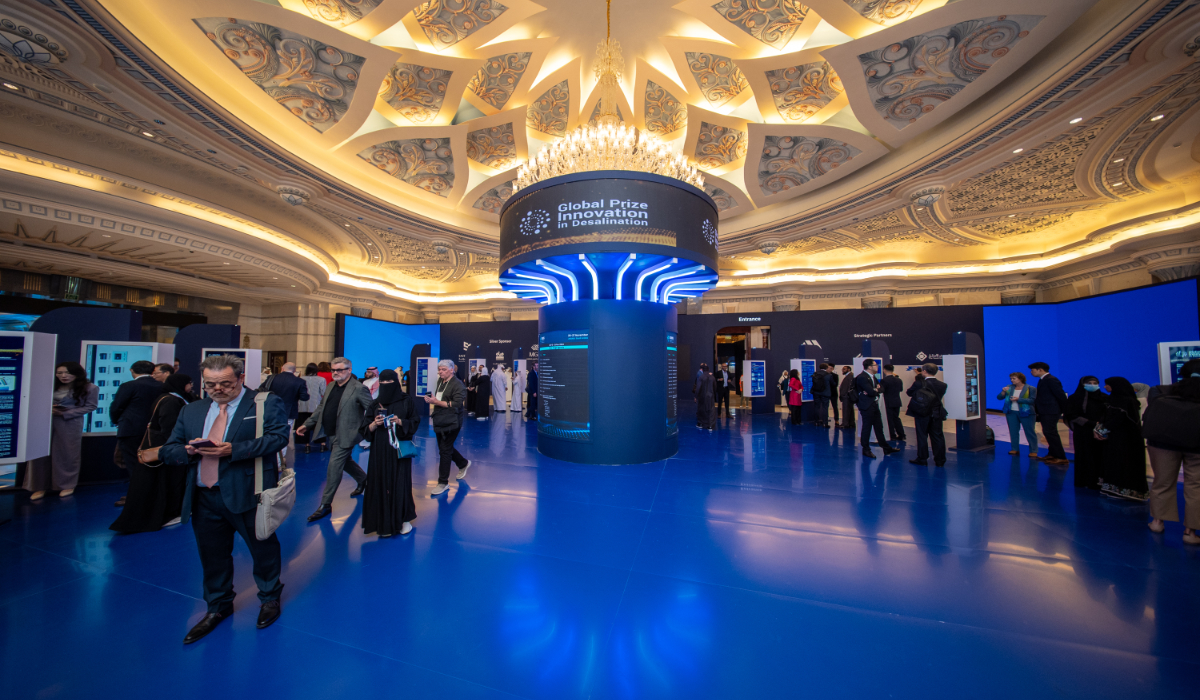RIYADH: Saudi Arabia is emerging as a hotspot for international investment. Its latest hook? Sustainable hospitality.
The Kingdom led the Middle East and Africa’s hotel-building activity in 2023, with 42,033 hotel rooms constructed. This accounted for 35.1 percent of the 119,505 built in the region over the year, according to data from hotel monitoring firm STR.
Saudi Arabia’s hotel segment is projected to generate $2.51 billion in revenue this year and is expected to reach $3.02 billion by 2027, according to Statista.
One of the Kingdom’s Vision 2030 goals is to champion sustainability across all sectors, and in turn, hotels and plazas across the country have been working to implement more environmental and eco-friendly practices in their facilities.
From 2010 to 2019, Saudi Arabia’s tourism industry has contributed an average of 6.4 percent to the country’s gross domestic product, while recording a decline in greenhouse gas emissions.
In contrast, the global GDP average for travel and tourism over the same period rose 4.3 percent, and emissions by 2.5 percent.
Several of Red Sea Global’s developments are already up and running along the Kingdom’s northwestern coastline, including the Six Senses Southern Dunes, The Red Sea and St. Regis Red Sea Resort.
The company recently announced further projects pillared by environmental sustainability.
The Four Seasons luxury wellness resort, Amaala, Triple Bay, is branded with regeneration and wellness at its core, and is set to feature a one-of-a-kind Corallium marine life institute.
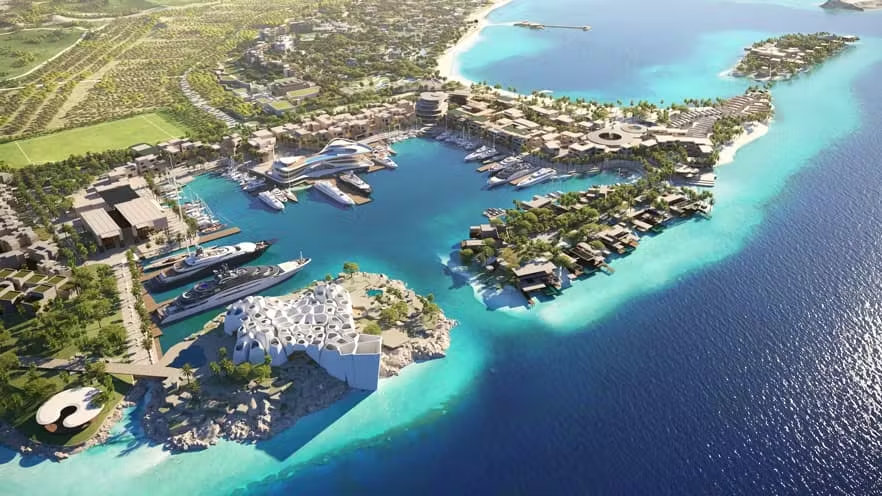
Saudi Arabia’s Triple Bay AMAALA will soon be home to a Four Seasons luxury wellness resort and is committed to sustainability, aligning with Four Seasons’ longstanding pledge to well-being. (Supplied)
Progress is also being made on a sustainability-focused staff village that will provide housing for those who work at the resort. RSG says that five international operator brands, including Six Senses and Clinique La Prairie, are expected to be confirmed in the coming months.
“Our mission to develop new destinations as beacons of responsible tourism, showcasing the best in sustainable and regenerative development, gains unprecedented urgency as our planet continues to face challenges in relation to the climate crisis and biodiversity loss,” John Pagano, RSG’s group CEO, said in a statement.
The economic zone NEOM recently unveiled three new sustainable hotels in its Leyja oasis, including three flagship Habitas properties, as well as Zardun, a sanctuary resort designed to harmonize with the surrounding ecosystem.
NEOM’s Hotel Development division has also sponsored Hotelschool The Hague to bring about the Sustainable Hospitality Challenge, bolstering a new generation of innovation in the industry.
Many of the resorts across Saudi Arabia are built to blend in with the surrounding environment. Take AlUla’s Habitas, for example, which boasts the city’s serene desert landscape that immerses guests in its untouched backdrop.
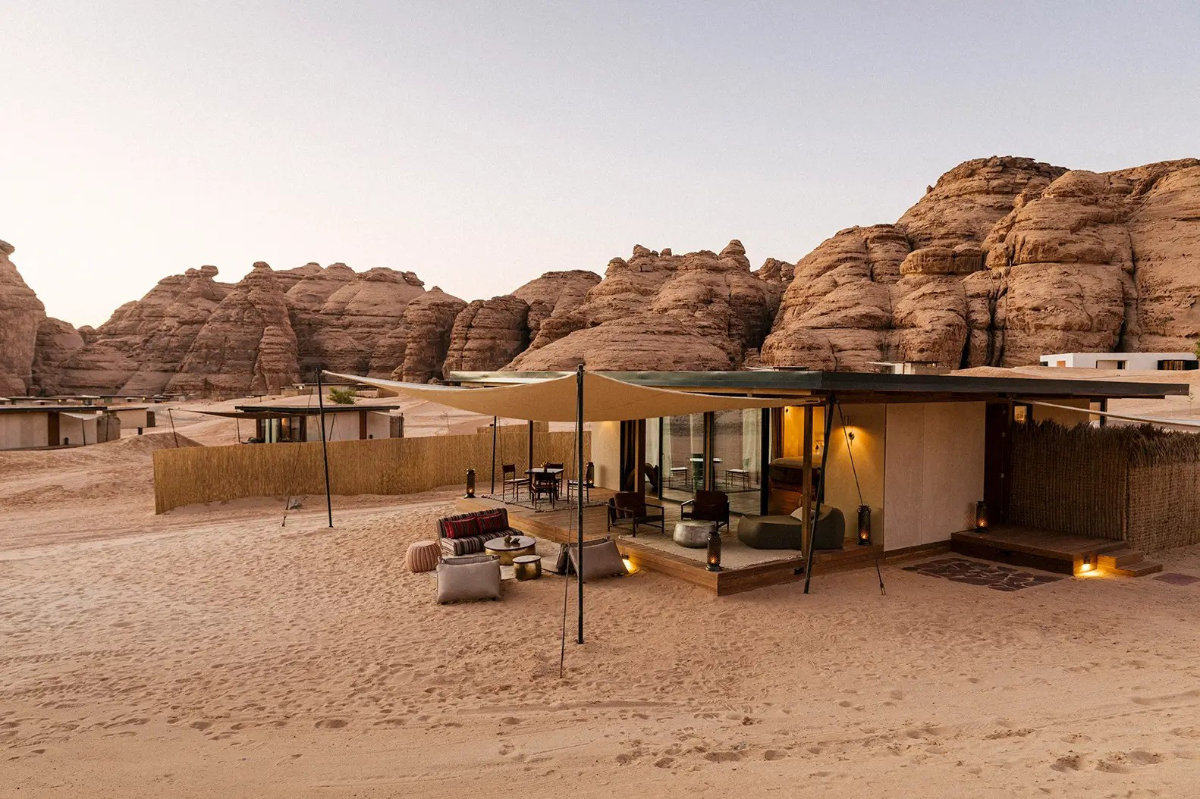
Habitas’ sustainable design and modular construction aim to minimize environmental impacts. It is free of single-use plastics, offsets carbon emissions, and manages waste, recycling and composting. (Supplied)
The luxury resort brand demonstrates its sustainable ethos, in line with the UN Sustainable Development Goals for 2030, through the offsetting of carbon emissions, waste management and a single-use plastic free policy.
“The AlUla Sustainability Charter is at the core of every hospitality project we develop within the destination,” Phillip Jones, chief tourism officer at the Royal Commission for AlUla, told Arab News.
“From the foundational design and materials of construction to the infrastructure, and the ongoing operations, as we only work with international operators that have a proven track record in sustainability, AlUla’s hotels and resorts each contribute toward delivering on our goals, such as achieving net carbon neutrality for local emissions by 2035.”
As the Arab region demonstrates overall lower environmental sustainability due to water scarcity, harsh climate and biodiversity threats, industry leaders are redefining the buzz term to fit local standards.
There are a number of grassroots projects that examine the existing traces of environmental sustainability awareness throughout the Arab region’s history. The Kingdom’s forefathers exhibited community-centered lifestyles, for example, while Islam advises its followers to conserve food and water consumption.
Chris Nader, CEO and co-founder of luxury ecolodge brand and management company ENVI Lodges, told Arab News: “Sustainability comes from a basis of trying to minimize our negative impacts on the environment. It’s not only nature, or animals — it’s also people.”
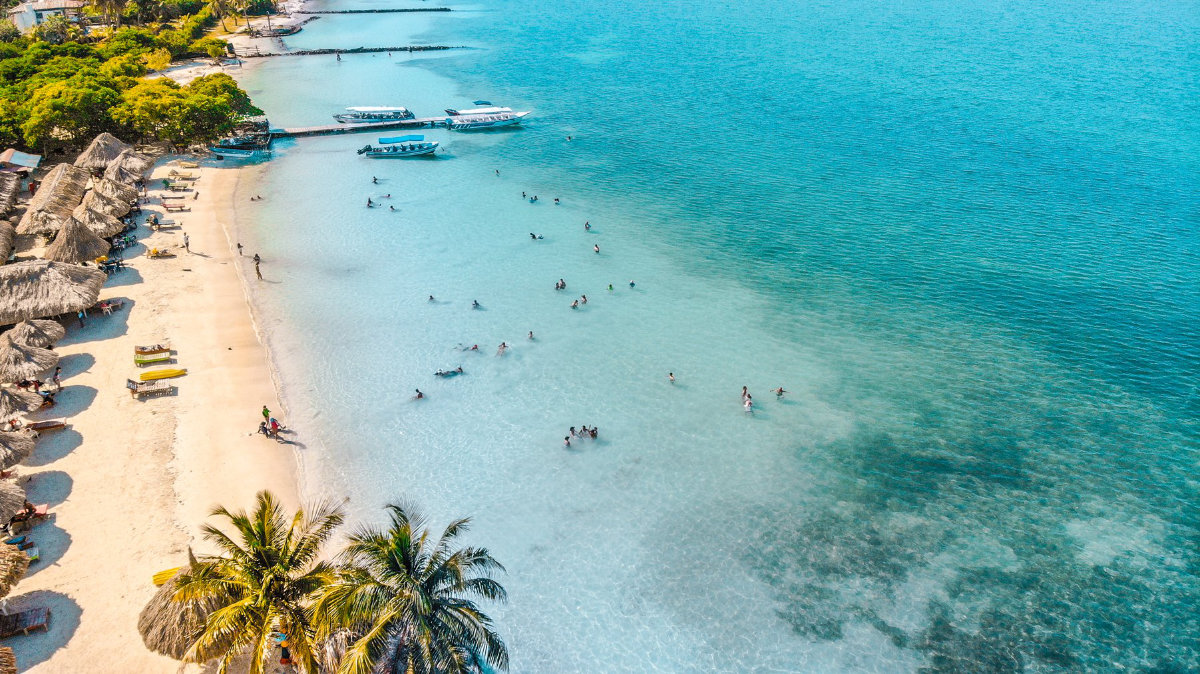
KAEC will host the first eco-friendly coastal resort in the distinguished and captivating Laguna area. (ENVI Lodges image)
ENVI Laguna Bay, a sustainable project developed by Al-Rasim Hotels and Resorts, will occupy a prime Red Sea coast beachfront destination in King Abdullah Economic City, surrounded by mangroves.
“KAEC will host the first eco-friendly coastal resort in the distinguished and captivating laguna area,” Aiad Mushaikh, CEO of Al-Rasim Hotels and Resorts, said in a statement.
The project strongly aligns with Saudi Arabia’s Vision 2030. Its road map for tourism sector growth includes respecting the land, protecting wildlife, supporting local communities, sourcing mindfully, in-house food production, engaging guests and designing a sense of place. These pillars have been built into the technical guidelines of building the lodge.
One common belief is that building necessitates the destruction of land. But through its design principles, ENVI demonstrates different approaches that can be taken to minimize its presence within the natural landscape. The company builds low-impact lodges that blend into the environment.
“We don’t do excavations,” said Nader. “We put our unit on stilts or decks, and we don’t build the units completely on the site so the amount of people and trucks on the site that have to come and go is very limited.”
An important element is also selecting materials from the environment, whether they be wood, rocks or mud, and sourcing materials and products that will maintain durability and integrity over time.
Opinion
This section contains relevant reference points, placed in (Opinion field)
The company also champions sourcing a percentage of the ingredients used in its kitchens from in-house gardens, developing programs for wildlife protection and hiring staff from local communities, all of which are tailor-made programs for each lodge.
The whole concept is to assume the project is temporary, aiming to leave the landscape more or less in the same state it was found in. The walkways are not poured concrete, and the native species are planted to cross-pollinate.
Another way to stitch sustainable practices within the fabric of the community is to engage guests in the initiative.
“Today, guests don’t want to be spectators,” said Nader. “They don’t want to be told that the lodge is planting mangroves. They want to plant themselves. Guests want to clean the beach, or the lodges, to remove any litter and plastic and all of that. They want to be involved in saving wildlife and caring.”
Saudi Arabia’s Public Investment Fund recently launched Dan Company, which specializes in agritourism and ecotourism. Architecture and design practice LWK + Partners is working on a project with Dan Co. that aims to invigorate the agriculture industry in Al-Ahsa through hospitality, serving as a benchmark for future projects.
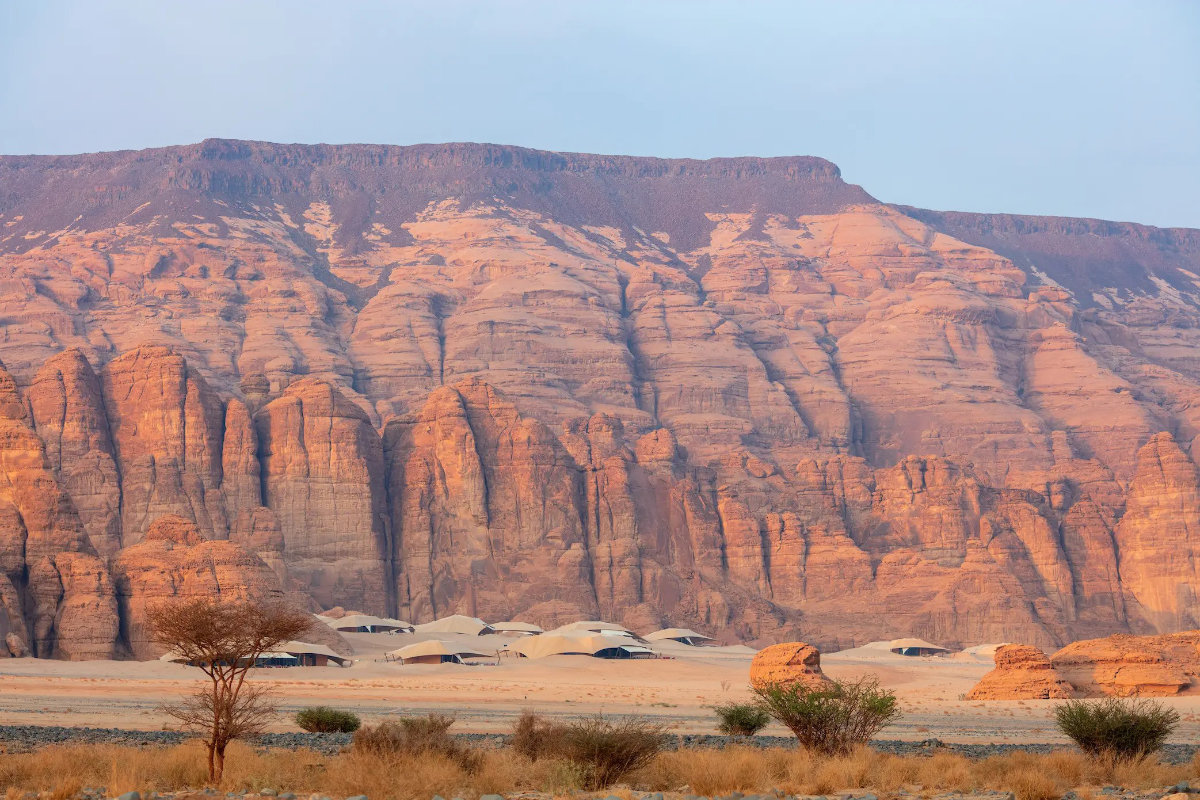
Ashar Valley’s Banyan Tree in AlUla has a plastic-free pledge as one of its key practices. The luxury brand is built on a sustainable ethos, committed to showing respect to its surroundings. (Supplied)
Kerem Cengiz, MENA managing director at LWK + Partners, told Arab News: “Sustainability isn’t just about the reduction of energy; sustainability is also about the way we create places that are harmoniously designed to make the way we interact with them sustainable.
“We look at sustainability as a holistic offering, rather than a series of tick boxes that we need to achieve.
“It really is important that when we design, we don’t have a pattern book; it still saddens me that we’ve seen many buildings going up that are just glass towers. They express a certain language and vision, but are they desirable in the context of the challenges that we’re facing environmentally?”
He added that the key to bridging these sustainable values into the future of the industry is to focus on a fundamental understanding of technology and innovation. How do you put in sensors that turn off the AC when guests leave the room, for example?
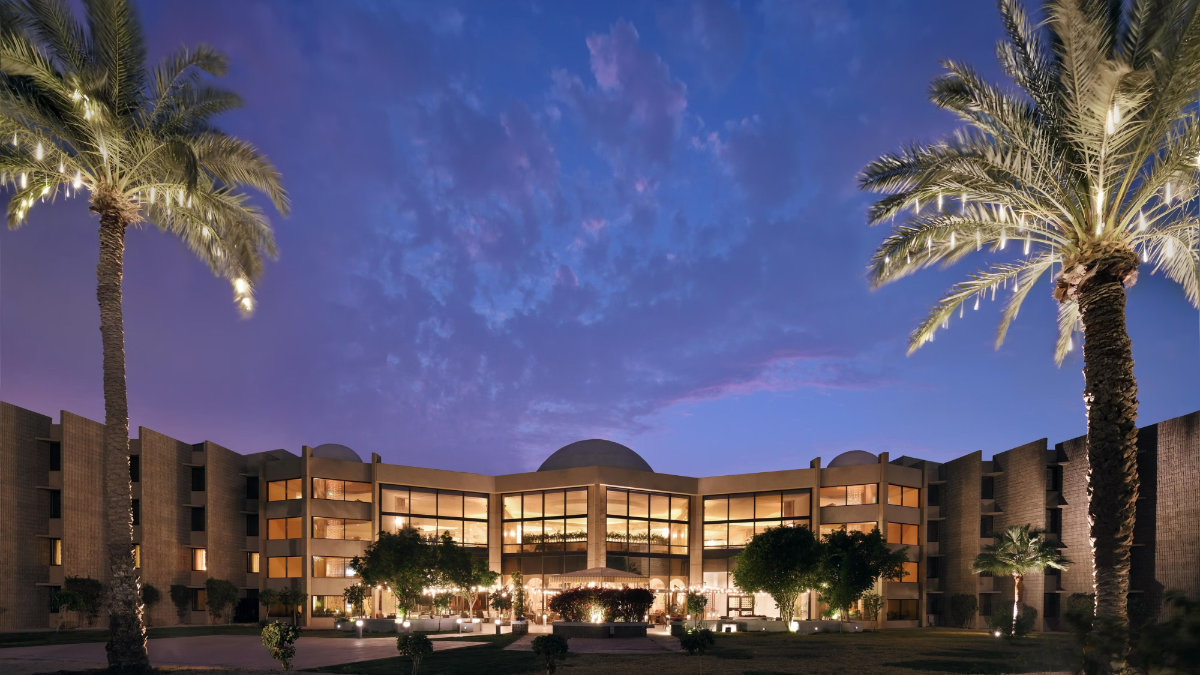
InterContinental Al-Jubail’s commitment to sustainability includes eco-friendly deep cleaning, water and electricity conservation, and voluntary beach cleaning campaigns. (Supplied)
Saudi Arabia is leading the way in many development practices, said Cengiz. The Holiday Inn Tabuk is utilizing solar energy as an alternative power source in some locations, while the InterContinental Jubail carries out voluntary campaigns to clean its beaches.
Like Nader, Cengiz said that private and public developers should move towards sourcing materials that are locally or regionally available. This adds great value not only economically, but also sustainably, by cutting down on products imported from overseas, simultaneously reducing carbon emissions.
He added: “Now, Saudi is developing its own market and its own product lines. I think that, in itself, has a massive impact and I would love to see more attention on that type of thing.
“I think we’re way past the 2030 Vision now. I mean, we’re evolving it much further into something significantly more impactful.”
